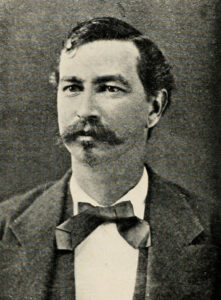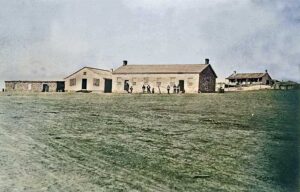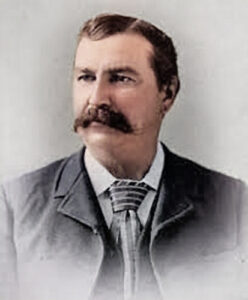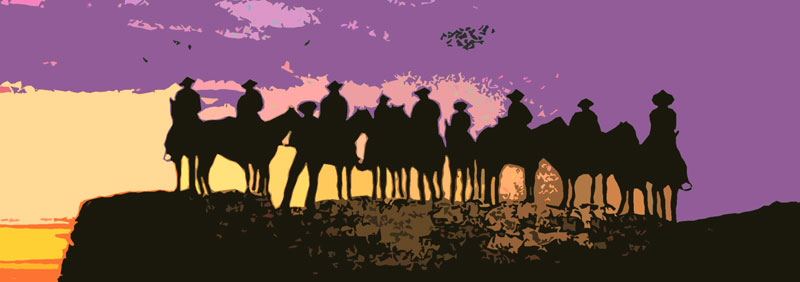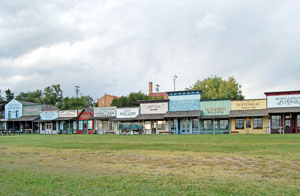Robert M. Wright was a stage driver, post-trader, businessman, and one of the founders of Dodge City, Kansas.
Robert Marr Wright was born in Bladensburg, Maryland, on September 2, 1840, to Robert Marr Wright Sr and Harriet Isabelle Caldwell Wright. Wright’s father, as a boy, aided wounded American soldiers on the Bladensburg battlefield. The British victory allowed the army to march into Washington, D.C. during the War of 1812 and burn many of the capital city’s essential government buildings. Among the buildings destroyed was the residence and private library of Wright’s maternal grandfather, Elias Boudinot Caldwell, a clerk of the United States Supreme Court for many years.
When he was just 16 years old, Wright decided to go west. He first worked on a farm near St. Louis, Missouri, until 1859. That year, at the age of 19, he returned east and married Alice J. Armstrong, a 13-year-old first cousin. He brought her back to southwest Kansas, where they resided years before there were any permanent settlements. The couple eventually had six children.
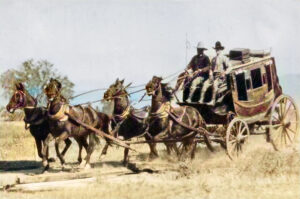
Stagecoach.
He crossed the Great Plains four times by wagon and twice by stagecoach. He then worked for Sanderson & Company Stage Line for three years, which carried mail and passengers between Colorado and western Kansas. Afterward, he worked various jobs, including cutting hay and wood and hauling grain.
In 1864, Wright’s wife and their two children were on his ranch northwest of present-day Dodge City when Indians raided. Robert Wright wasn’t home, but Alice Wright and a hired hand kept the raiders at bay until the family could escape. As a result, the family abandoned the ranch and moved to Fort Aubrey, Kansas.
General Ulysses S. Grant, who knew the Wright family in Maryland, appointed Robert the sutler or post-trader at Fort Dodge, Kansas, in 1867.
In 1872, Wright left the Fort for the nearby buffalo hunters’ outpost that later became Dodge City. Along with Charles Rath, he opened one of the town’s first businesses, the Rath & Co. General Store. The store sold goods to the hunters for buffalo hides and cash. They shipped out over 200,000 hides in their first year of business.
In 1877, Charles Rath sold his interest in the Rath Store to H.M. Beverly and A.J. Anthony. Wright continued a partnership with them, renaming the store Wright, Beverly & Co. Later, Beverly and Anthony dropped out, and the store became R.M. Wright & Co.
In 1878, Wright pocketed $25,000 as a “fee” from the South Texas cattleman and steamboat operator Mifflin Kenedy. The money was paid to gain the acquittal of Kennedy’s son, James W. “Spike” Kennedy, in the inadvertent shooting death of the popular dance hall singer Dora Hand, who was courted by both Spike Kennedy and Mayor James Kelley.
Wright made and lost a fortune in his career; so did Kelley, but on a lesser scale. During the 1880 cattle season, Wright earned $200,000 a month.
From 1875 to 1883, Wright represented Ford County in the Kansas House of Representatives for four two-year terms. He was also the mayor of Dodge City for four years.
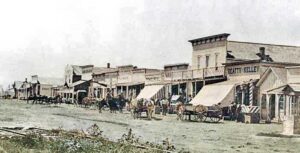
Dodge City, Kansas in about 1875.
Robert’s wife Alice died suddenly in St. Louis, Missouri, on Christmas Day, 1892.
Wright married Caryl “Carrie” DeVoe in 1897.
He was appointed Commissioner of Forestry in 1899 and reappointed in 1901.
Somewhere along the line, Wright and his wife Carrie divorced, and he married Sallie Olive Ivens in 1907. She bore him a son, Conner R. Wright, a United States Navy veteran of World War II who lived until 1970.
Wright suffered heavy financial losses later in life and attempted to recoup some economic stability by selling his land and remaining 110 head of cattle, but had trouble finding buyers.
In 1913, Wright penned an autobiography entitled Dodge City, The Cowboy Capital and the Great Southwest in the Days of the Wild Indian, the Buffalo, the Cowboy, Dance Halls, Gambling Halls, and Bad Men. The title is often shortened to Dodge City, the Cowboy Capital. Unfortunately, a fire destroyed his publishing company in Wichita, Kansas, and he lost money on the venture.
After suffering declining health, Wright died early on January 4, 1915, at the age of 74. He was buried in Maple Grove Cemetery in Dodge City. His oldest son, Robert Henry Wright, died in Silverton, Colorado, in June 1915, some five months after his father’s passing.
Wright Park in Dodge City and the community of Wright, Kansas, in Ford County are named in his honor.
“How many of us have often experienced these feelings on the frontier of Kansas in the early days. Yet this kind of life gives one a zest for adventure, for it is a sort of adventure to which he not only becomes accustomed but attached. In fact, there is a fascination about it difficult to resist, and having once felt its power, one could not permit himself to give it up.”
— Robert M. Wright, describing the lure, danger, and challenges of living on the western prairies.
©Kathy Alexander/Legends of Kansas, updated June 2025.
Also See:
Dodge City, Kansas – A Wicked Little Town
Sources:
Conservapedia
Dodge City Globe
Find-a-Grave
Kansas Business Hall of Fame

